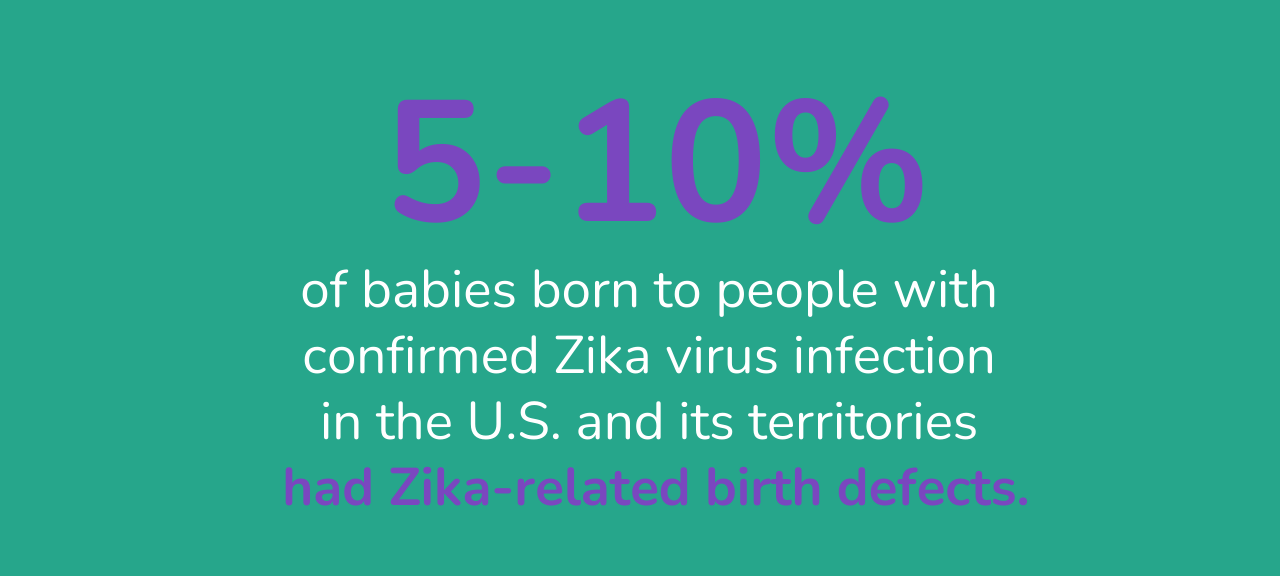How Zika Virus Infection Impacts Pregnancy & Breastfeeding
Disclaimer: This page houses important information and resources pertaining to Zika virus infection during pregnancy and while breastfeeding, including links to our evidence-based Fact Sheets. However, the resources here should not replace the care and advice of a medical professional.
Zika is a virus that is usually spread by infected mosquitoes, but can also be spread through sexual contact with an infected partner or blood transfusions with infected blood. In addition, if a person gets Zika during pregnancy, the virus can pass to the developing baby. Four out of 5 people who are infected with Zika do not have any symptoms – but they can still pass the virus to others through sexual contact or to a developing baby in pregnancy.

Reference: Reynolds et al., 2017 and Shapiro-Mendoza et al., 2017
Babies who are exposed to Zika during pregnancy have an increased chance of certain birth defects and developmental problems known as “congenital Zika syndrome” (CZS). Babies who have CZS can have a very small head and brain, severe brain defects, eye defects, hearing loss, seizures, and/or problems with joint and limb movement. Zika infection in pregnancy can also increase the chance of miscarriage or stillbirth.
Zika virus has been found in breast milk, but there are no reports of infants getting Zika from breastfeeding. Based on current information, experts believe that the benefits of breastfeeding outweigh any potential risks of Zika infection through breastfeeding.
The only way to completely prevent Zika infection during pregnancy is to not travel to areas with risk of Zika and to use precautions or avoid sex with someone who has recently traveled to a risk area.”
— Centers for Disease Control and Prevention (CDC)
Please see our library of resources below on Zika during pregnancy and breastfeeding. You can also download or order our bilingual Zika Information Rack Card by visiting our Materials Request Form.
Related Fact Sheets
Related Baby Blogs
- Vector-Borne Illnesses: How to Fight the (Bug) Bite During Pregnancy
- Immunization Education: Everything You Need to Know About Vaccines Before and During Pregnancy
- Zika, Pregnancy, and Travel in a Post-Epidemic World
- Special Edition Baby Blog: What Do All the Colors Mean? Zika, Pregnancy & Travel in a Post-Epidemic World
- COVID-19, the Flu, and Zika: Considerations for Pregnancy in the Winter Travel Season
- Guest Blog: Trouble in Paradise
- “Spread Prevention, Not the Infection” during Pregnancy
- How I Got the Zika Virus and How You Can Too: Protecting Yourself and Your Family
- Father’s Day Food for Thought: Zika in a Man’s World
- Fighting The Bite: A Woman’s Guide to Avoiding Zika in Pregnancy
External Resources
- Centers for Disease Control and Prevention: Zika and Pregnancy
- Centers for Disease Control and Prevention: Zika Transmission
- Centers for Disease Control and Prevention: Protect Yourself & Others from Zika
- Centers for Disease Control and Prevention: Zika Travel Planning
- Centers for Disease Control and Prevention: Zika Symptoms, Testing, & Treatment
- March of Dimes: Zika Virus and Pregnancy
Partners
Stay in Touch
Our e-Newsletter brings you the latest information, news, and resources from the experts at MotherToBaby.
Join a Study
Expecting parents deserve better information about medication use in pregnancy and breastfeeding – and you can help by participating in a study.
Ask Our Experts
Call, text, chat, or email for a free personalized risk assessment on exposures in pregnancy and breastfeeding.

